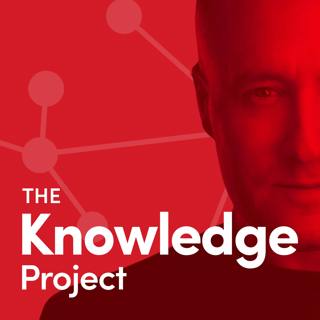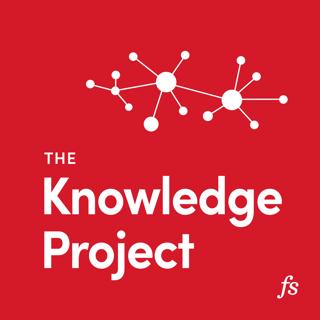![Andy Grove: Only The Paranoid Survive [Outliers]](https://cdn.podme.com/podcast-images/0741D17D81A9D36C6AB2E236340D263D_small.jpg)
Andy Grove: Only The Paranoid Survive [Outliers]
Most people protect their identity. Andy Grove would rewrite his, again and again. He started as a refugee, became a chemist, turned himself into an engineer, then a manager, and finally the CEO who built Intel into a global powerhouse. He didn’t cling to credentials or titles. When a challenge came up, he didn’t delegate, he learned. This episode explores the radical adaptability that made Grove different. While his peers obsessed over innovation, he focused on something far more enduring: the systems, structures, and people needed to scale that innovation. Grove understood that as complexity rises, technical brilliance fades and coordination becomes king. You’ll learn how he redefined leadership, why he saw management as a creative act, and what most founders still get wrong about building great companies. If you’re serious about getting better—at work, at thinking, at leading—this is the episode you’ll be glad you didn’t miss. This episode is for informational purposes only and most of the research came from The Life and Times of an American by Richard S. Tedlow, Only the Paranoid Survive by Andy Grove, and Tom Wolfe’s profile of Robert Noyce available here. Check out highlights from these books in our repository, and find key lessons from Grove here — https://fs.blog/knowledge-project-podcast/outliers-andy-grove/ (05:02 ) PART 1: Hungarian Beginnings(06:48) German Occupation(09:27) Soviet Liberation(11:01) End of the War(12:35) Leaving Hungary (14:10) PART 2: In America(16:50) Origin of Silicon Valley(20:04) Fairchild (22:54) PART 3: Building Intel(25:15) Becoming a Manager(29:39) Intel's Make-or-Break Moment(31:35) Quality Control Obsession(34:41) Orchestrating Brilliance(37:49) The Microprocessor Revolution and Intel's Growth(40:32) Intel's Growth and the Microma Lesson(30:51) The Grove Influence(47:00) The Birth of Intel Culture(49:42) The Fruits of Transformation(50:43) The Test Ahead (53:07) PART 4: Inflection Points(55:23) The Valley of Death(58:26) The IBM Lesson(01:01:18) CASSANDRA’s: The Value of Middle Management(01:04:09) Executing a Painful Pivot (01:08:25) Reflections, afterthoughts, and lessons Thanks to our sponsors for supporting this episode: MOMENTOUS: Head to livemomentous.com and use code KNOWLEDGEPROJECT for 35% off your first subscription. NOTION MAIL: Get Notion Mail for free right now at notion.com/knowledgeproject Upgrade — If you want to hear my thoughts and reflections at the end of all episodes, join our membership: fs.blog/membership and get your own private feed. Newsletter — The Brain Food newsletter delivers actionable insights and thoughtful ideas every Sunday. It takes 5 minutes to read, and it’s completely free. Learn more and sign up at fs.blog/newsletter Learn more about your ad choices. Visit megaphone.fm/adchoices
20 Touko 1h 21min

Elad Gil: How to Spot a Billion-Dollar Startup Before the Rest of the World
What if the world’s most connected tech investor handed you his mental playbook? Elad Gil, an investor behind Airbnb, Stripe, Coinbase and Anduril, flips conventional wisdom on its head and prioritizes market opportunities over founders. Elad decodes why innovation has clustered geographically throughout history, from Renaissance Florence to Silicon Valley, where today 25% of global tech wealth is created. We get into why he believes AI is dramatically under-hyped and still under-appreciated, why remote work hampers innovation, and the self-inflicted wounds that he's seen kill most startups. This is a masterclass in pattern recognition from one of tech's most consistent and accurate forecasters, revealing the counterintuitive principles behind identifying world-changing ideas. Disclaimer: This episode was recorded in January. The pace of AI development is staggering, and some of what we discussed has already evolved. But the mental models Elad shares about strategy, judgment, and high-agency thinking are timeless and will remain relevant for years to come. Approximate timestamps: Subject to variation due to dynamically inserted ads. (2:13) - Investing in Startups (3:25) - Identifying Outlier Teams (6:37) - Tech Clusters (9:55) - Remote Work and Innovation (11:19) - Role of Y Combinator (15:19) - The Waves of AI Companies (20:24) - AI's Problem Solving Capabilities (26:13) - AI's Learning Process (30:41) - Prompt Engineering and AI (32:00) - AI's Role in Future Development (34:37) - AI's Impact on Self-Driving Technology (40:16) - The Role of Open Source in AI (43:23) - The Future of AI in Big Players (44:23) - Regulation and Safety Concerns in AI (49:11) - Common Self-Inflicted Wounds (51:34) - Scaling the CEO and Avoiding Conventional Wisdom (55:21) - Workplace Culture (58:39) - Patterns Among Outlier CEOs (1:15:50) - Remote Work and its Implications (1:18:47) - The Impact of Clusters and Exceptional Individuals (1:25:41) - Investing in Defense Technology (1:27:38) - Business Model Shift in the Defense Industry (1:31:46) - Changes in Warfare SHOPIFY: Upgrade your business and get the same checkout I use. Sign up for your one-dollar-per-month trial period at shopify.com/knowledgeproject NORDVPN: To get the best discount off your NordVPN plan go to nordvpn.com/KNOWLEDGEPROJECT. Our link will also give you 4 extra months on the 2-year plan. There's no risk with Nord’s 30 day money-back guarantee! Newsletter - The Brain Food newsletter delivers actionable insights and thoughtful ideas every Sunday. It takes 5 minutes to read, and it’s completely free. Learn more and sign up at fs.blog/newsletter Upgrade — If you want to hear my thoughts and reflections at the end of the episode, join our membership: fs.blog/membership and get your own private feed. Watch on YouTube: @tkppodcast Learn more about your ad choices. Visit megaphone.fm/adchoices
13 Touko 1h 36min
![Rose Blumkin: Women of Berkshire Hathaway [Outliers]](https://cdn.podme.com/podcast-images/0741D17D81A9D36C6AB2E236340D263D_small.jpg)
Rose Blumkin: Women of Berkshire Hathaway [Outliers]
Rose Blumkin didn’t just build a business. She revolutionized retail. After fleeing Russia with $66 in her purse, she opened a basement furniture store in Omaha at 43 years old—with no English, no education, and no connections. Her formula? Sell cheap, tell the truth, don't cheat the customer. Nebraska Furniture Mart would survive depressions, fires, lawsuits, tornadoes—and eventually become a billion-dollar empire Warren Buffett called “the ideal business.” Learn how Mrs. B’s relentless focus, radical simplicity, and unbreakable work ethic built an empire from scratch—and what her story teaches us about business, resilience, and the power of earned trust. This episode is for informational purposes only and most of the research came from "Women of Berkshire Hathaway" and oral history interviews with Rose Blumkin and her daughter Frances. Check out highlights from this book in our repository, and find key lessons from Blumkin here — fs.blog/knowledge-project-podcast/outliers-rose-blumkin (03:20) PART 1: Early Childhood (07:10) A Natural Entrepreneur (09:37) PART 2: Building an Empire (12:53) The Competition (15:54) The Passing of Isadore (18:32) Expansion through Hardship (20:32) Natural Instinct for Character (25:15) PART 3: The $60m Handshake / The Buffett Connection (28:25) A Rebel at 96 (33:47) Reflections, afterthoughts, and lessons Thanks to our sponsors for supporting this episode: MOMENTOUS: Head to livemomentous.com and use code KNOWLEDGEPROJECT for 35% off your first subscription. NOTION MAIL: Get Notion Mail for free right now at notion.com/knowledgeproject Upgrade — If you want to hear my thoughts and reflections at the end of all episodes, join our membership: fs.blog/membership and get your own private feed. Newsletter — The Brain Food newsletter delivers actionable insights and thoughtful ideas every Sunday. It takes 5 minutes to read, and it’s completely free. Learn more and sign up at fs.blog/newsletter Learn more about your ad choices. Visit megaphone.fm/adchoices
6 Touko 43min

Garry Tan: How Y Combinator Turns Ambitious Misfits Into Billion-Dollar Founders
Most accelerators fund ideas. Y Combinator funds founders—and transforms them. With a 1% acceptance rate and alumni behind 60% of the past decade’s unicorns, YC knows what separates the founders who break through from those who burn out. It's not the flashiest résumé or the boldest pitch but something President Garry Tan says is far rarer: earnestness. In this conversation, Garry reveals why this is the key to success, and how it can make or break a startup. We also dive into how AI is reshaping the whole landscape of venture capital and what the future might look like when everyone has intelligence on tap. If you care about innovation, agency, or the future of work, don’t miss this episode. Approximate timestamps: Subject to variation due to dynamically inserted ads. (00:02:39) The Success of Y Combinator (00:04:25) The Y Combinator Program (00:08:25) The Application Process (00:09:58) The Interview Process (00:16:16) The Challenge of Early Stage Investment (00:22:53) The Role of San Francisco in Innovation (00:28:32) The Ideal Founder (00:36:27) The Importance of Earnestness (00:42:17) The Changing Landscape of AI Companies (00:45:26) The Impact of Cloud Computing (00:50:11) Dysfunction with Silicon Valley (00:52:24) Forecast for the Tech Market (00:54:40) The Regulation of AI (00:55:56) The Need for Agency in Education (01:01:40) AI in Biotech and Manufacturing (01:07:24) The Issue of Data Access and The Legal Aspects of AI Outputs (01:13:34) The Role of Meta in AI Development (01:28:07) The Potential of AI in Decision Making (01:40:33) Defining AGI (01:42:03) The Use of AI and Prompting (01:47:09) AI Model Reasoning (01:49:48) The Competitive Advantage in AI (01:52:42) Investing in Big Tech Companies (01:55:47) The Role of Microsoft and Meta in AI (01:57:00) Learning from MrBeast: YouTube Channel Optimization (02:05:58) The Perception of Founders (02:08:23) The Reality of Startup Success Rates (02:09:34) The Impact of OpenAI (02:11:46) The Golden Age of Building MOMENTOUS: Head to livemomentous.com and use code KNOWLEDGEPROJECT for 35% off your first subscription. Newsletter - The Brain Food newsletter delivers actionable insights and thoughtful ideas every Sunday. It takes 5 minutes to read, and it’s completely free. Learn more and sign up at fs.blog/newsletter Upgrade — If you want to hear my thoughts and reflections at the end of the episode, join our membership: fs.blog/membership and get your own private feed. Watch on YouTube: @tkppodcast Learn more about your ad choices. Visit megaphone.fm/adchoices
29 Huhti 2h 20min
![Henry Singleton: The CEO Who Bought Back 90% of His Company's Shares [Outliers]](https://cdn.podme.com/podcast-images/0741D17D81A9D36C6AB2E236340D263D_small.jpg)
Henry Singleton: The CEO Who Bought Back 90% of His Company's Shares [Outliers]
If Warren Buffett is the king of capital allocation—Henry Singleton is the ghost. Singleton built one of the most successful conglomerates in American history, transforming business while remaining virtually unknown. While Wall Street chased fads, Singleton, who could play chess blindfolded, quietly turned industrial conglomerate Teledyne into a business juggernaut with 20.4% annual returns over nearly three decades—outperforming Buffett, outmaneuvering rivals, and outlasting the hype. Dive into the mind of a man who Charlie Munger said had "the best operating and capital deployment record in American business—bar none." This is a masterclass in disciplined capital allocation and long-term thinking on the most underrated business genius of the 20th century. If you're building a business, allocating capital, or simply trying to think more clearly in a noisy world, you cannot afford to miss this one. (03:16) Prologue (05:59) PART 1: THE MAKING OF A MAVERICK (07:48) After MIT (10:24) Founding of Teledyne (14:04) The Future is Semiconductors (17:18) What to Acquire? (19:12) Integrating into the Teledyne System (21:49) Vasco Metals and George Roberts (23:40) PART 2: MASTER CAPITAL ALLOCATOR (28:10) Entering Insurance (29:44) The Great Buyback Revolution (32:46) Teledyne Operating Systems (34:56) Thinking Local (37:41) Building Knowledge (39:59) PART 3: PEAK PERFORMANCE (42:51) Planning for Retirement (44:09) Passing the Torch (46:45) End of an Era: Singleton Retires (47:41) Teledyne After Singleton (48:46) Singleton’s Legacy (51:05) SHANE’S REFLECTIONS This episode is for informational purposes only and most of the research came from reading Distant Force: A Memoir of the Teledyne Corporation and the Man Who Created It, with an Introduction to Teledyne Technologies by Dr. George A. Roberts with Robert J McVicker and The Outsiders by William N. Thorndike, Jr. Additional source: 1979 Interview with Forbes MOMENTOUS: Head to livemomentous.com and use code KNOWLEDGEPROJECT for 35% off your first subscription. Check out highlights from these books in our repository, and find key lessons from Singleton here —https://fs.blog/knowledge-project-podcast/outliers-henry-singleton/ Upgrade — If you want to hear my thoughts and reflections at the end of all episodes, join our membership: fs.blog/membership and get your own private feed. Newsletter — The Brain Food newsletter delivers actionable insights and thoughtful ideas every Sunday. It takes 5 minutes to read, and it’s completely free. Learn more and sign up at fs.blog/newsletter Learn more about your ad choices. Visit megaphone.fm/adchoices
22 Huhti 58min

Bret Taylor: A Vision for AI’s Next Frontier
What happens when one of the most legendary minds in tech delves deep into the real workings of modern AI? A 2-hour long masterclass that you don’t want to miss. Bret Taylor, current chairman of OpenAI, unpacks why AI is transforming software engineering forever, how founders can survive acquisition (he’s done it twice), and why the true bottlenecks in AI aren’t what most think. Drawing on his extensive experiences at Facebook, Google, Twitter and more, he explains why the next phase of AI won’t just be about building better models—it’s about creating entirely new ways for us to work with them. Bret exposes the reality gap between what AI insiders understand and what everyone else believes. Listen now to recalibrate your thinking before your competitors do. (00:02:46) Aha Moments with AI (00:04:43) Founders Working for Founders (00:07:59) Acquisition Process (00:14:14) The Role of a Board (00:17:05) Founder Mode (00:20:29) Engineers as Leaders (00:24:54) Applying First Principles in Business (00:28:43) The Future of Software Engineering (00:35:11) Efficiency and Verification of AI-Generated Code (00:36:46) The Future of Software Development (00:37:24) Defining AGI (00:47:03) AI Self-Improvement? (00:47:58) Safety Measures and Supervision in AI (00:49:47) Benefiting Humanity and AI Safety (00:54:06) Regulation and Geopolitical Landscape in AI (00:55:58) Foundation Models and Frontier Models (01:01:06) Economics and Open Source Models (01:05:18) AI and AGI Accessibility (01:07:42) Optimizing AI Prompts (01:11:18) Creating an AI Superpower (01:14:12) Future of Education and AI (01:19:34) The Impact of AI on Job Roles (01:21:58) AI in Problem-Solving and Research (01:25:24) Importance of AI Context Window (01:27:37) AI Output and Intellectual Property (01:30:09) Google Maps Launch and Challenges (01:37:57) Long-Term Investment in AI (01:43:02) Balancing Work and Family Life (01:44:25) Building Sierra as an Enduring Company (01:45:38) Lessons from Tech Company Lifecycles (01:48:31) Definition and Applications of AI Agents (01:53:56) Challenges and Importance of Branded AI Agents (01:56:28) Fending Off Complacency in Companies (02:01:21) Customer Obsession and Leadership in Companies Bret Taylor is currently the Chairman of OpenAI and CEO of Sierra. Previously, he was the CTO of Facebook, Chairman of the board for X, and the Co-CEO of Salesforce. Newsletter - The Brain Food newsletter delivers actionable insights and thoughtful ideas every Sunday. It takes 5 minutes to read, and it’s completely free. Learn more and sign up at fs.blog/newsletter Upgrade — If you want to hear my thoughts and reflections at the end of the episode, join our membership: fs.blog/membership and get your own private feed. Watch on YouTube: @tkppodcast Learn more about your ad choices. Visit megaphone.fm/adchoices
15 Huhti 2h 8min

Pierre Poilievre: What I Want to Build (and Break) To Fix Canada
Pierre Poilievre, leader of Canada’s Conservative Party, reveals a roadmap for restoring opportunity and unity across the country. From unleashing innovation by cutting red tape, to reigniting upward mobility and building a powerhouse economy, Poilievre’s message goes beyond borders. If you care about restoring opportunity, strengthening democracy, and securing a brighter future for North America, listen closely—Canada’s solutions might just inspire America’s renewal. TRANSCRIPT EN: https://fs.blog/knowledge-project-podcast-transcripts/pierre-poilievre-223/ FR: https://fs.blog/knowledge-project-podcast-transcripts/pierre-poilievre-223-francaise/ (01:41) Headline vs Reality (03:55) From Opposition Party to Unifier (07:05) Parenthood Shapes Priorities (10:05) Differentiating from the Liberals (15:04) Economic Value Creation in Canada (18:08) WEF Opposition Stance (25:27) Balanced Budget Plan (28:15) Attracting Investments (35:25) Productivity Gap Explained (38:50) Tariffs Response Tactics (41:10) Reducing US Dependency (44:15) Interprovincial Trade Impacts (45:40) "China” (47:42) Media Accountability Challenges (51:42) Digital Free Speech Protections (55:10) Crime (01:02:00) Access to Health Care (01:06:15) A modern and effective Canadian military (01:11:10) AI: balance innovation with protection (01:12:49) How do we ensure that the government can be held accountable in a world where they might control information flow? (01:14:10) Trust in government post-COVID (01:15:56) Climate change (01:18:50) Biggest misconceptions about Mr. Poilievre (01:19:50) What Canadian success looks like Thanks to ShipStation for supporting this episode: Get a 60-day free trial at www.shipstation.com/knowledgeproject. Newsletter - The Brain Food newsletter delivers actionable insights and thoughtful ideas every Sunday. It takes 5 minutes to read, and it’s completely free. Learn more and sign up at fs.blog/newsletter Upgrade — If you want to hear my thoughts and reflections at the end of our episode, join our membership: fs.blog/membership and get your own private feed. Watch on YouTube: @tkppodcast Learn more about your ad choices. Visit megaphone.fm/adchoices
13 Huhti 1h 21min
![Cornelius Vanderbilt: The First Tycoon [Outliers]](https://cdn.podme.com/podcast-images/0741D17D81A9D36C6AB2E236340D263D_small.jpg)
Cornelius Vanderbilt: The First Tycoon [Outliers]
Cornelius Vanderbilt was a force in 19th century America, playing a pivotal role in transitioning the U.S. economy from rural mercantilism to industrial corporate capitalism. Vanderbilt didn't just compete—he dominated; and didn’t just dominate one industry—he conquered three: ferries, steamships, and railroads. He understood that power lay in controlling infrastructure and not just operating within it. His cutthroat tactics were both feared and admired but his vision for what the economy could be was undeniable. This is the story of how Vanderbilt turned calculated aggression into an art form, how he endured more pain than his competitors, and how he built systems that outlived him. Learn the mindset, strategies, and brutal lessons behind his dominance; the game of business hasn’t changed as much as you think. (02:20) Prologue (05:12) PART 1 - The Dutch Inheritance (08:21) The Young Boatman (12:30) Capitalizing on War (15:27) General Merchant of the Sea (19:29) PART 2 - The Meeting That Changed Everything (21:48) The Steamboat Wars (24:12) The Anti-Monopoly Crusader (27:06) The Rise of the Commodore (32:08) The Monopolist's Nemesis (34:58) PART 3 - Sole Control (37:28) Prometheus (40:18) Star of the West (44:06) Europe and Betrayal (48:15) The Independent Line (50:13) PART 4 - The Commodore’s Return (51:55) Gray Eyed Man of Destiny (53:36) The Conspiracy (54:41) Finishing Walker (55:54) Conquering the Seas (58:13) America's Wealthiest Citizen (60:47) PART 5 - Vanderbilt's Railroad Dominance (01:01:59) The Path to Confrontation (01:03:37) The Breaking Point (01:04:43) The Power to Punish (01:06:32) The Collapse (01:07:50) The Silent Conquest (01:08:57) The Consolidation (01:10:54) The Legacy (01:12:15) FINAL PART - Vanderbilt: The Architect of Modern American Business (01:14:19) Reflections This episode is for informational purposes only and most of the research came from reading The First Tycoon by T.J. Stiles and Tycoon’s War by Stephen Dando-Collins. Check out highlights from these books in our repository, and find key lessons from Cornelius Vanderbilt here — fs.blog/knowledge-project-podcast/outliers-cornelius-vanderbilt Upgrade — If you want to hear my thoughts and reflections at the end of all episodes, join our membership: fs.blog/membership and get your own private feed. Newsletter — The Brain Food newsletter delivers actionable insights and thoughtful ideas every Sunday. It takes 5 minutes to read, and it’s completely free. Learn more and sign up at fs.blog/newsletter Learn more about your ad choices. Visit megaphone.fm/adchoices
8 Huhti 1h 22min






















